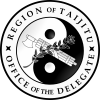Template:Current featured article
The Delegate of Taijitu is the head of government and de facto head of state of Taijitu. They are charged under the region's constitution with upholding both the constitution itself and any other laws. They are assisted in this task by an appointed cabinet of ministers. The constitution also provides that the delegate is the commander in chief of the armed forces and may negotiate treaties with foreign powers, veto legislation of the Senate and nominate justices to the Court. Unique among government offices, the delegate also holds power in-game, voting on behalf of the region in World Assembly resolutions. They are elected every seven weeks alongside the Senate by an instant runoff vote on the same ticket as a Vice Delegate who assumes the delegate's office if they become unable to serve. The most recent elections were concluded on August 25th, 2013 and the current delegate is Dyr Nasad.
The nature of the office of Delegate has changed significantly over time. Originally, the Delegate was elected by a plurality and permitted to hold a seat in the Senate, though forbidden to vote except to break any ties. They were also had no power of veto. The method of election was later changed to a Schulz Condorcet vote and the Delegate given a Senate vote but stripped of their tie breaking powers before the adoption of the modern constitution and the office's current powers.
The delegate may be removed from office in one of two ways. The first of these is through impeachment. The Senate may impeach the delegate by a majority vote. If this happens, a referendum is held on the removal of the delegate from office. A referendum to recall the delegate from office may also be initiated by a petition. Any referendum to remove the delegate from office requires a two-thirds super-majority to succeed.
- Main article: Delegate of Taijitu
